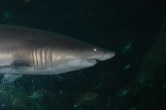Sharks - Cold blooded killers?
A predator is any animal that kills other animals for food. The most powerful predators are flesh eaters, e.g; sharks and lions. Animals that prey on their own species are called cannibals.
We, humans, think of sharks as cold blooded killers. Are they? Are sharks really predators? And are sharks really stalking humans or not? Sylvie Leochko says: "We must not forget that every time we set a foot in the ocean, we enter their house without having been invited. As a matter of fact, while certain precautions should be taken to avoid shark attacks we should keep in mind that most of the time, a shark will attack out of confusion or when feeling threatened by human’s presence. Humans are NOT their favorite food; on the contrary, sharks prefer chubby seals than bony humans." The two largest sharks - the Whale shark and the Basking shark - are virtually harmless to people and can literally be approached by divers without any safety concerns? The same can be said about the Leopard shark, the Horn shark, the Brown Smoothhound shark and the zebra shark.
Recorded Attacks
According to the ISAF (International Shark Attack File) between 1580 and 2005, there were 1187 unprovoked shark attacks done by 36 types of sharks. In fact, 17 of the 36 species involved in unprovoked shark attacks were responsible for 5 shark attacks or less. These types of sharks are: the Galapagos shark, the Tope shark, the Silvertip shark, the Spiny Dogfish shark, the Tresher shark, The Bignose shark, the Smooth Dogfish shark, the Basking shark, the Horn shark, the Sixgill shark, the Whale shark, the Greenland shark, the Whitetip Reef shark, the Porbeagle shark, the Leopard shark, the Mako shark and the Great Hammerhead shark.
Of the remaining 19 types of sharks known to harm humans, 6 types of sharks are responsible for 6 to 9 unprovoked shark attacks. These are the following species: the Grey Reef shark, the Oceanic Whitetip shark, the Sandbar shark, the Sevengill shark, the Dusky shark and the Silky shark.
Of the 13 types of sharks that are left, 3 species are responsible for 14 to 19 unprovoked shark attacks. These are the following types of sharks: the Spinner shark, the Blacktip Reef shark and the Bronze Whaler shark. Of the 10 types of sharks that have been involved in 23 to 27 unprovoked shark attacks on humans, you have the 3 following shark species: the Lemon shark, the Caribbean Reef shark and the Wobbegong shark. Now you have the top ten sharks that have been known to attack humans, 7 species are responsible for unprovoked shark attacks while 3 species that were mentioned earlier on this page have been involved in provoked shark attacks. The 7 species are: the Great White shark, the Tiger shark, the Bull shark, the Sand Tiger shark, the Requiem shark, the Nurse shark and the Blacktip shark.
The top 10 species are: the Great White shark (1), the Tiger shark (2), the Bull shark (3), the Sand Tiger shark (4), the Requiem shark (5), the Nurse shark (6), the Shortfin Mako (7), the Blacktip shark (8), the Hammerhead shark (9) and the Blue shark (10). The numbers of shark attacks done by these species vary between 36 and 410. As you can see, the 20% types of sharks involved in shark attacks may seem impressive but not as alarming as you may have thought at first.
Vinnie La Sorsa's broader picture regarding shark attacks let me share some facts regarding shark attacks and information about the Shark species and population.
Sharks do not plan attacks on human beings, Sharks are not smart enough to plot. Shark attacks happen because sharks become confused and accidentally bite humans because they mistake them as prey.
Almost 95% of shark attacks happen in 6FT of water or less, if you notice the geographical locations or conditions which they happen the attacks are almost always in areas where water clarity and visibility are poor. When the water clarity is poor sharks rely more on their senses which pick up movement and vibrations rather then there eyesight, so swimmers wading in the murky shallows rarely but sometimes get a sharks attention. Sharks don’t enjoy the taste of human flesh or the smell of human blood, in fact when Sharks identify us correctly they will not attack unless provoked.
Sharks sometimes bite humans because much like a dog who feels its food with it’s mouth first before they consume it, due to the fact they do not have hands as “feelers”, to figure out if the food is edible. A Sharks mouth is it’s only way of feeling and testing any object it finds questionable, unfortunately by the time a Shark figures out it doesn’t want or is uninterested in the object in question it has suffered a shark bite.
Sharks are some of the oldest creatures on the planet, we should do our best to understand and protect them.



